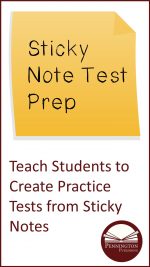Five Objective Test Tips
Answering objective test problems isn’t simply a matter of knowing the answers. Although knowing the answers certainly does help! Establishing an approach to answering objective test problems will help the test-taker best problem-solve and access information reviewed during test study. Having such an approach to every test problem will reduce test anxiety and will also assist in effective time management while completing the exam.
Here is the best approach to answering objective test problems:
1. Read each question or test problem twice before looking at the answers. However, only re-read the question stem, not the answer choices. The question stem is bolded or separated from the answer responses in a multiple-choice or matching section. It is easy to miss a key word if you only read the question or test problem just once.
2. Be alert for certain key words in the test problem and circle these, if permitted. Key words include “absolute words” such as the following:
-not, never, always, completely
and “exception words” such as the following:
-frequently, sometimes, mostly, often, almost, may, can.
3. Try to predict the correct answer before you look at the choices offered. This will provide a mind-set for evaluating the answer choices before you begin to answer. This process also helps to unlock your prior knowledge about the subject gained from test study and life experience.
4. Read all answer choices before selecting an answer. Test-takers frequently say that this strategy helps eliminate rushing though a test and answering impulsively. If failing to read all of the answer choices is a compulsive problem, try reading the answer choices in reverse. Reading bottom to top does not take any more time.
5. Look for the wrong answers first, not the right ones. Using the process of elimination will help you narrow down the answer choices. Your guessing odds are much better with each wrong answer eliminated. Also, it is easier to make a decision between fewer choices than many. After all, isn’t it easier to choose among three ice-cream flavors rather than among thirty-one flavors? Finally, make sure to guess, if not sure of your answer choice.
Check out these five FREE test prep resources from the author’s Essential Study Skills curriculum:
Get the Test Prep Skills FREE Resource:
![]()
The author’s Essential Study Skills is the study skill curriculum that teaches what students need to know to succeed and thrive in school. Often, the reason why students fail to achieve their academic potential is not because of laziness or lack of effort, but because they have never learned the basic study skills necessary for success. The 56 lessonsin Essential Study Skills will teach your students to “work smarter, not harder.” Students who master these skills will spend less time, and accomplish more during homework and study time. Their test study will be more productive and they will get better grades. Reading comprehension and vocabulary will improve. Their writing will make more sense and essays will be easier to plan and complete. They will memorize better and forget less. Their schoolwork will seem easier and will be much more enjoyable. Lastly, students will feel better about themselves as learners and will be more motivated to succeed. em>Essential Study Skills is the ideal curriculum for study skill, life skill, Advocacy/Advisory, Opportunity Program classes. The easy-to-follow lesson format of 1. Personal Assessment 2. Study Skill Tips and 3. Reflection is ideal for self-guided learning and practice. Contact the publisher for affordable site licenses.

 Taking tests can be very stressful experiences. The key to
Taking tests can be very stressful experiences. The key to 
